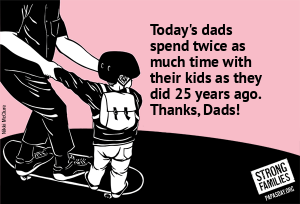
The Pew Research Center recently published a report called ”Modern Parenthood” about the changing roles of moms and dads and how both now struggle to meet the often competing demands of work and family. What they found won’t startle many parents in the trenches today: the roles of moms and dads are converging, especially in dual-income families. Moms are doing more paid work outside the home, dads are doing more unpaid care work inside the home, and both now report work-family conflict in nearly equal numbers (56% of mothers and 50% of fathers) – a real shift from decades past when working mothers bore the brunt of juggling work and family.
But attitudes about work and family have changed much faster than the public policies designed to support families. A 2008 study from the Families and Work Institute found that only 34% of millenials think it’s better for the family if the man earns the money and the woman takes care of the home and children – compared to 51% of those aged 63 and up (both are down from the 70% of men who felt this way in 1977). Young men are less interested in very long hours at work and increasingly expect that they will need and be able to spend more time with their kids than their dads did – and they’re doing it, too.
And there’s no going back. Sixty percent of two-parent households with kids under 18 now have two working parents – and that number is only expected to grow. Combine that with the growing number of single parent households and you can see that our experiences of work-family conflict and its negative economic impact on families – and fathers – will only intensify.
There are many factors that predict work-family conflict for fathers, including: the more hours a dad works, the more child care he takes on, the less supportive his supervisor is of his family responsibilities, the less autonomy he has at work, and the more pressure he feels on the job.
 And it’s worth remembering that kids do better when their dads are more involved in raising them. Countless studies and projects like the National Fatherhood Initiative and the U.S. Department of Health and Human Services’ “Promoting Responsible Fatherhood Program” have shown clear benefits to a child’s long-term development, success at school and myriad other positive outcomes due to paternal involvement.
And it’s worth remembering that kids do better when their dads are more involved in raising them. Countless studies and projects like the National Fatherhood Initiative and the U.S. Department of Health and Human Services’ “Promoting Responsible Fatherhood Program” have shown clear benefits to a child’s long-term development, success at school and myriad other positive outcomes due to paternal involvement.
Yet despite the enormous cultural shift in work and family and the proven upsides to dads doing more caregiving and moms doing more earning, very few public policies have been enacted to better support the important combination of paid work and family caregiving.
We know we can’t go back (and most of us don’t want to), so it’s time to create the infrastructure that allows moms and dads to balance the demands of work and family. Families and their whole communities benefit when all parents have access to paid family leave to bond with a new baby, options for flexible work arrangements, and access to affordable child care. Working toward this is the only reasonable path forward.


